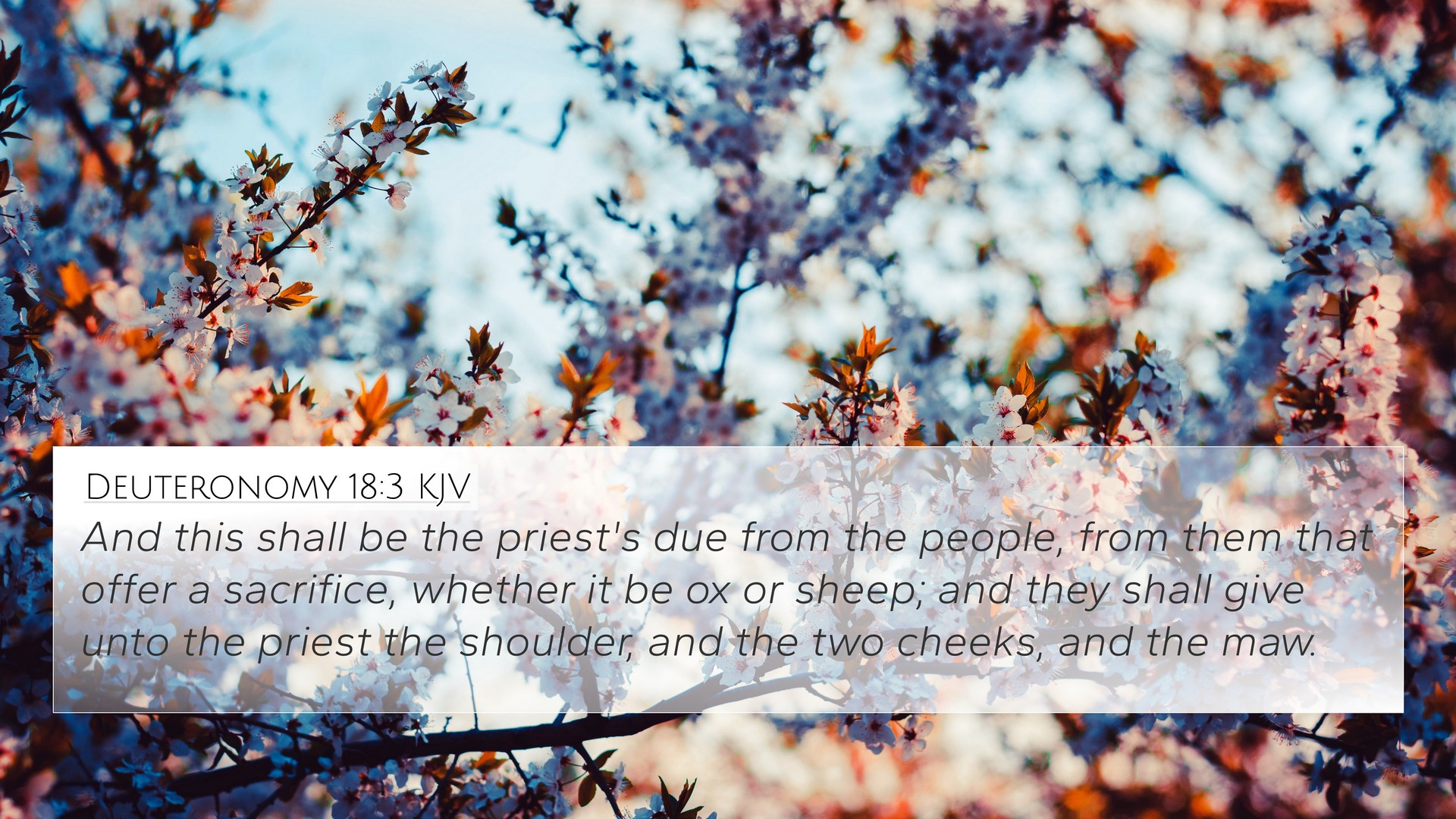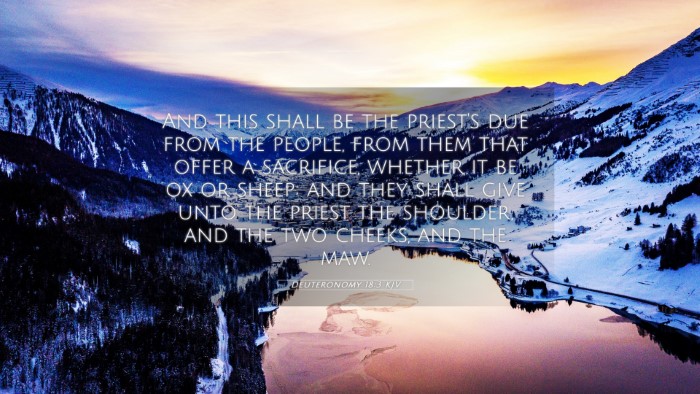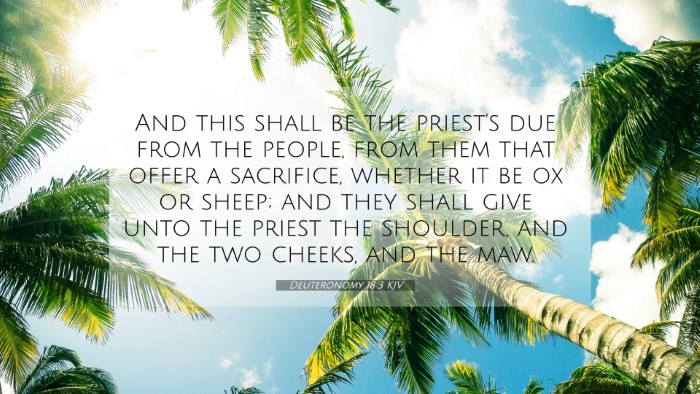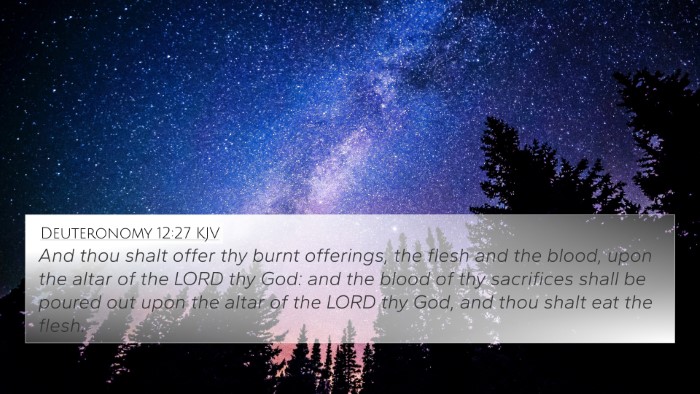Understanding Deuteronomy 18:3
Deuteronomy 18:3 provides important insights into the responsibilities and rights of the priests and Levites concerning offerings made by the people of Israel. The verse states:
“And this shall be the priest’s due from the people, from them that offer a sacrifice, whether it be ox or sheep; and they shall give unto the priest the shoulder, and the two cheeks, and the maw.”
Meaning and Interpretation
When interpreting Deuteronomy 18:3, we can draw insights from various public domain commentaries which illuminate the significance of this scripture:
- Matthew Henry: Henry emphasizes the importance of priests in mediating between God and the people. This verse highlights their right to compensation as they perform their sacred duties. The specified portions (the shoulder, the two cheeks, and the maw) symbolize the physical nourishment provided to the priests, which in turn enables them to serve the spiritual needs of the community.
- Albert Barnes: Barnes notes that it is a common practice in ancient Israel for those who offer sacrifices to provide portions of the offerings to the priests. This practice serves not only as a means of physical support for the priests but also as an acknowledgment of their unique role in worship and abidance by God’s laws.
- Adam Clarke: Clarke elaborates that this command reflects the divine law concerning the priestly rights. He stresses the idea that the Levites, who had no inheritance of land, were entirely dependent on these offerings from the community, thereby placing responsibility upon the people to honor the priests through their sacrifices.
Thematic Connections
This verse connects to several themes within the Bible regarding duty, servitude, and the provision of God:
- Support for God’s Servants: The verse underscores the principle that those who dedicate their lives to spiritual service deserve support from the community.
- Divine Provision: By establishing a system of offerings, God ensures that the priests are provided for, emphasizing His care and concern for His servants.
- Community Responsibility: The responsibilities allocated to the community highlight a collective duty toward spiritual leaders.
Cross-References
Deuteronomy 18:3 can be linked to several other Bible verses that offer deeper understanding and context:
- 1 Corinthians 9:13-14: Discusses the obligation to provide for those who preach the gospel.
- Leviticus 7:31-34: Details further about the priest’s portions from various offerings.
- Numbers 18:8-10: Highlights the specific rights and responsibilities of the priests in receiving offerings.
- Hebrews 7:12: Relates the priestly order to Christ and the permanence of His priesthood.
- Malachi 3:10: Addresses the giving of tithes and how it supports the temple and the priests.
- Exodus 29:28: Talks about the contributions to the priests as part of the consecration process.
- Luke 10:7: Jesus instructed the disciples to accept food and drink from those they ministered to, linking back to priestly support.
Connections Between Bible Verses
Understanding Deuteronomy 18:3 involves recognizing the connections between Bible verses that deal with the themes of sustenance for spiritual leaders:
- Bible verses that relate to each other: This supports a broader notion of interdependence between laypeople and spiritual leaders.
- Cross-referencing Biblical texts: This verse serves as a bridge to understand how New Testament teachings about pastoral care originate in Old Testament practices.
- Thematic Bible verse connections: Identifies themes of service, gratitude, and provision throughout scripture.
Scriptural Cross-Referencing
Utilizing tools for Bible cross-referencing can deepen the study of Deuteronomy 18:3:
- Employ a Bible concordance to find associated themes of provision and service.
- A Bible cross-reference guide can assist in navigating between Old and New Testament verses that discuss priestly duties.
- Engage in cross-reference Bible study to compare priestly rights across different texts.
Conclusion
The significance of Deuteronomy 18:3 extends far beyond its immediate context, reflecting a broader biblical narrative about the importance of supporting spiritual leaders. This verse encourages believers to engage in cross-referencing Biblical texts, thereby enriching their understanding of the interconnectedness of scripture. By examining related verses and the roles assigned to priests, one can appreciate the depth of God’s provision and the expectations placed upon the community of faith.




